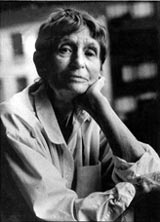The Recently Dead


Two wonderful writers died recently, one we've published, Jerzy Ficowski, one we would've loved to publish, Marianne Hauser.
Below is a tribute to Marianne Hauser from her good friend Raymond Federman, followed by an obituary for Jerzy Ficowski from the Forward.
ETERNAL RETURN
For Marianne Hauser
By Raymond Federman
As we old bums [you & me & your mom & the other bum in peeoria] contemplate what appears to others to be l'âge [vieillesse ou vieilles fesses] as we admire [with a touch of disdain] our own amazing present mental agility [and virility too] as we delight in the fact that we are becoming so good [so dexterous] so much better with words as we get older [perhaps even wiser in spite of the cliché] as we listen [especially at night] to those protracted echoes of the void [excuse the terminal lyricism] but without asking [as in days of youth] whence the original sound [I almost said original sin) came [sometimes unwanted] as we contemplate the landscape of words we designed and left behind us [not without pain] yes as we contemplate the not too distant moment when we will have to change tense [inevitably so] we wonder [often aloud] how the hell have we managed to come this far [to do that much] with words [words words our whole life was but a pell mell babel of words] and look oh look how they fall in place now so easily so quietly our words as they say [or fail to say] what they want to say before crumbling into the great void [excuse the romantic agony] alright crumbling into the motherfucking abyss of forgetfulness [le grand abîme de l’oubli]
Jerzy Ficowski, a peerless advocate for the arts and letters of a decimated Polish Jewry, died in Warsaw on May 9, at the age of 82.
Following World War II, during which he served in the Home Army and participated in the Warsaw Uprising, Ficowski published nearly 20 volumes of poetry, including the acclaimed "A Reading of Ashes." However, it was his work as an archivist that marked him for greatness: Having witnessed the genocide, and the ongoing oppression of the Roma, Ficowski became one of the few translators from their languages, producing renditions of folktales lauded for their whisper-weight mastery.
Translations from Yiddish followed, as well as from Russian. Ficowski humbled his gifts, too, in the shadow of Bruno Schulz, perhaps the greatest Polish Jewish writer of modernity, murdered by the Gestapo in 1942. If not for Ficowski, who was not Jewish, Schulz's work would have been lost. Ficowski later published a seminal "biographical portrait" of Schulz called "Regions of the Great Heresy."
Ficowski would produce only one book of his own fiction, a set of stories that extend Schulz's preoccupation with estrangement, and with dreaming as escape, into new worlds of isolation — muted by violence, beset by the politics of catastrophe. Only this month did that book, "Waiting for the Dog To Sleep" (Twisted Spoon Press), find its way into the English language; copies arrived at Ficowski's house two weeks before his death. A riddling, forbidding colloquy of fantasies fevered by war and privation, it offers only the grayest of consolation: the pleasures of a last cigarette, the aroma of a cup of coffee, the quiescence of hiding. "The dead things are glad," Ficowski writes. "I have descended to be one of them, from this moment on."

0 Comments:
Post a Comment
Subscribe to Post Comments [Atom]
<< Home